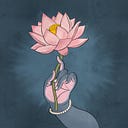The Bhojaśāla Sarasvati
King Bhoja, the most celebrated ruler of the Paramāra Dynasty, was a great patron of education and the arts. At his palace in Dhara (now in Madhya Pradesh), he constructed the Bhojaśāla, an elaborate temple dedicated to poetry and learning. Its central deity was Vāgdevī (goddess of speech), a form of Goddess Saraswati that stood in the hall’s precinct. The Vāgdevi murthi is currently housed in the British Museum. The vigraha bears an inscription that reads (translated):
“Auṃ. Vararuci, who is intent on the dharma of the Candranagarī and Vidyādharī of Srīmad Bhoja the king, [….] having first fashioned Vāgdevī the mother [and] afterwards a triad of Jinas, made this beautiful image of Ambā, ever abundant in fruit. Blessings!”
The Bhojaśāla was constructed in the 11th century AD and bore numerous inscriptions of Prākrit and Sanskrit poetry, some composed by Raja Bhoja himself. The Bhojaśāla was not only a Sarasvati temple but a centre of learning and a Hindu institution and a centre for knowledge and the arts. It was later converted into the Kamala Maula mosque by Dilawar Khan in 1405. Hindus are allowed entry into the Bhojaśāla only once a year, on Vasant Pañcami every year.
The Department of Archaeology, Gwalior, 1952, has in a special book dealt on the Cultural Heritage of Madhya Bharat, which, in 1956, amalgamated with the Central Provinces and came to be known as Madhya Pradesh. This book, ‘Dhar and Mandu’ reiterates what Major C.E. Luard, the official gazeteer of Dhar, had said in 1912. The carved pillars used all over the building and the delicately carved ceilings of the prayer hall seem to have belonged to the original Bhojaśāla. On the pavement of the prayer hall are seen numerous slabs of black slate stone the writings on which were also scraped off. From a few slabs recovered from another part of the building and now exhibited there, which contain the texts of the poetic works of Pārijātamañjari and Kūrmastotra, it appears that the old college was adorned with numerous Sanskrit and Maharashtri Prakrit texts, beautifully engraved on slabs.
References/Source:
The Cane Groves Of Narmada River: Erotic Poems From Old India by Andrew Schelling
Hindu Masjids by Shri Prafull Goradia
